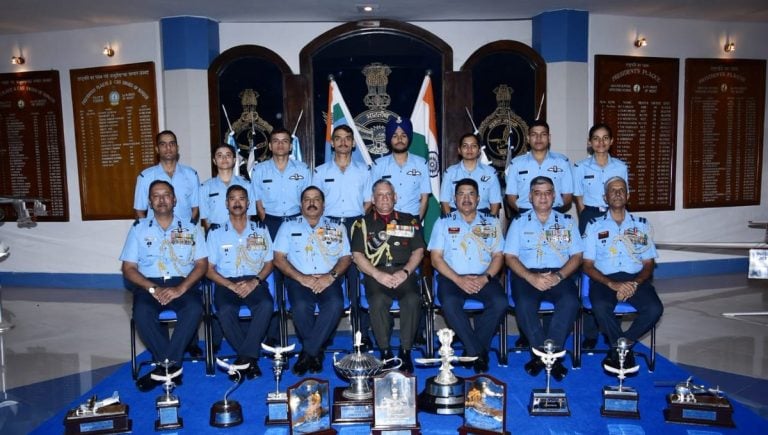Are you aspiring to join the Indian Air Force as a commissioned officer? The Air Force Common Admission Test (AFCAT) is the gateway to your dream career. AFCAT is a highly competitive exam that tests your knowledge, aptitude, and reasoning skills. To crack this exam and secure a place in the prestigious Indian Air Force, you need a strategic approach and effective preparation. In this article, we will provide you with valuable AFCAT exam preparation tips and tricks for 2024.
Understanding the AFCAT Exam
Before delving into the preparation strategies, it is essential to understand the AFCAT exam pattern, syllabus, and marking scheme.
AFCAT Exam Pattern
The AFCAT exam consists of multiple-choice questions (MCQs) with four options for each question. The exam is divided into four sections:
- General Awareness
- Verbal Ability
- Numerical Ability
- Reasoning and Military Aptitude
The duration of the exam is two hours, and each section carries equal weightage.
AFCAT Syllabus
The AFCAT syllabus covers a wide range of topics. Here are some key areas to focus on:
- General Awareness: Current affairs, history, geography, sports, politics, awards, and honors.
- Verbal Ability: Vocabulary, grammar, comprehension, synonyms, antonyms, and sentence completion.
- Numerical Ability: Number systems, averages, percentages, ratio and proportion, time and work, speed and distance, and simple interest.
- Reasoning and Military Aptitude: Verbal and non-verbal reasoning, spatial ability, rotation, analogy, and embedded figures.
AFCAT Marking Scheme
For each correct answer, candidates are awarded three marks, and for each incorrect answer, one mark is deducted. Unattempted questions do not carry any negative marks.
Creating a Study Plan
A well-structured study plan is crucial for effective preparation. Here’s how you can create a study plan for the AFCAT exam:
Setting Realistic Goals
Start by setting realistic goals for your preparation. Break down your syllabus into manageable chunks and set achievable targets for each day, week, and month.
Prioritizing Topics
Identify the topics that carry more weightage in the exam and prioritize them in your study plan. Allocate more time and effort to these topics while ensuring that you cover the entire syllabus.
Allocating Time for Revision
Dedicate a significant portion of your study plan for revision. Regular revision helps reinforce the concepts and improves retention. Allocate specific time slots for revision throughout your preparation period.
Collecting Study Material
Gathering the right study material is crucial for effective preparation. Here are some sources you can consider:
Official AFCAT Study Material
Start by referring to the official AFCAT study material provided by the Indian Air Force. This material covers the entire syllabus and provides valuable insights into the exam pattern and question types.
Recommended Books and Resources
Refer to recommended books and resources that cover the AFCAT syllabus comprehensively. Get the AFCAT Previous Year Papers ebook and AFCAT Maths and AFCAT English eBook.
Online Study Material and Mock Tests
Explore online platforms that provide study material, practice questions, and mock tests specifically designed for AFCAT preparation. These platforms offer comprehensive resources and real-time exam experience.
Mastering General Awareness
General Awareness is a crucial section in the AFCAT exam. Here’s how you can excel in this section:
Current Affairs Preparation
Stay updated with the latest current affairs by reading newspapers, magazines, and online news portals. Make a habit of noting down important events, awards, appointments, and sports achievements.
Static General Knowledge
Focus on static general knowledge topics such as history, geography, Indian polity, and science. Create concise notes and revise them regularly to improve retention.
Defence-related Topics
Pay special attention to defense-related topics such as the Indian Air Force’s history, organization, aircraft, and missile systems. Familiarize yourself with the latest defense technologies and developments.
Strengthening Verbal Ability
Verbal Ability is a crucial section that tests your English language skills. Here’s how you can improve in this area:
Vocabulary Enhancement
Work on improving your vocabulary by learning new words every day. Maintain a vocabulary journal and use flashcards or online tools to revise and practice word meanings and synonyms.
Reading Comprehension
Practice reading comprehension passages regularly and develop strategies to extract key information quickly. Focus on improving your reading speed and comprehension skills.
Grammar and Sentence Correction
Brush up on your grammar rules and practice sentence correction exercises. Pay attention to common errors such as subject-verb agreement, tenses, and punctuation.
Sharpening Numerical Ability
Numerical Ability requires a strong foundation in basic mathematical concepts. Here’s how you can improve in this area:
Basic Mathematical Concepts
Ensure that you have a clear understanding of basic mathematical concepts such as number systems, averages, percentages, ratio and proportion, time and work, speed and distance, and simple interest.
Data Interpretation
Practice solving data interpretation questions to improve your analytical skills. Learn different methods to interpret and analyze data presented in the form of tables, graphs, and charts.
Practice and Speed Enhancement Techniques
Regular practice is key to improving numerical ability. Solve a variety of numerical problems from different topics and work on increasing your speed and accuracy by using shortcut techniques.
Improving Reasoning and Military Aptitude
The Reasoning and Military Aptitude section tests your logical and analytical thinking abilities. Here’s how you can excel in this area:
Verbal Reasoning
Practice solving verbal reasoning questions such as analogy, classification, series completion, and logical deductions. Develop strategies to identify patterns and relationships quickly.
Non-Verbal Reasoning
Master non-verbal reasoning topics such as figure classification, figure series, and embedded figures. Practice solving non-verbal reasoning questions to improve your visualization and spatial abilities.
Military Aptitude Questions
Familiarize yourself with military aptitude questions that assess your decision-making and problem-solving skills in real-life scenarios. Understand the basic principles and concepts of the Indian Air Force.
Enhancing English Language Skills
English language skills are crucial for the AFCAT exam. Here’s how you can improve in this area:
Grammar and Usage
Revise grammar rules and practice exercises to enhance your understanding of English grammar. Focus on topics such as tenses, subject-verb agreement, articles, prepositions, and sentence structure.
Vocabulary and Idioms
Continue to expand your vocabulary by learning new words, idioms, and phrases. Practice using them in sentences to improve your expression and written communication skills.
Comprehension and Para Jumbles
Practice reading comprehension passages and answering questions based on them. Work on improving your comprehension skills and practice solving para jumbles to enhance your logical thinking abilities.
Practicing Previous Year Question Papers
Solving previous year question papers is an effective way to understand the exam pattern, question types, and time management. Here’s how you can make the most of it:
Understanding Exam Pattern and Question Types
Analyze the previous year question papers to understand the distribution of questions across different sections. Identify the frequently asked topics and question types to prioritize them in your preparation.
Time Management Techniques
Solve the previous year question papers within the allotted time to practice time management. Identify the sections or types of questions that consume more time and strategize accordingly.
Identifying Strengths and Weaknesses
Analyze your performance in the previous year question papers to identify your strengths and weaknesses. Focus on improving your weak areas while maintaining your strengths.
Joining Mock Tests and Online Coaching
AFCAT Mock tests and AFCAT online coaching by SSBCrackExams provide a simulated exam experience and expert guidance. Here’s how they can benefit your preparation:
Simulating Real Exam Conditions
Take mock tests in a simulated exam environment to get accustomed to the exam pressure and time constraints. This will help you build confidence and improve your speed and accuracy.
Analyzing Performance and Identifying Areas of Improvement
Analyze your performance in mock tests to identify areas where you need improvement. Focus on understanding the solutions and strategies provided by the coaching platform to enhance your performance.
Expert Guidance and Tips
Online coaching platforms provide expert guidance and tips from experienced faculty members. Leverage their knowledge and expertise to strengthen your preparation strategies and overcome challenges.
Revision and Time Management
Revision is an integral part of effective preparation. Here’s how you can manage your time and make the most of your revision:
Creating a Revision Schedule
Allocate specific time slots for revision in your study plan. Create a schedule that allows you to revise all the topics multiple times before the exam.
Focus on Weak Areas
Pay extra attention to your weak areas during revision. Identify the topics or concepts that you find challenging and dedicate more time to revise and practice them.
Time Management Strategies during Exam
Practice time management techniques while solving mock tests and previous year question papers. Learn to prioritize questions based on their difficulty level and allocate time accordingly.
Taking Care of Physical and Mental Health
AFCAT preparation can be demanding, both physically and mentally. Here’s how you can take care of your well-being:
Regular Exercise and Fitness
Engage in regular physical exercise to stay fit and active. Incorporate activities like jogging, yoga, or any form of exercise that suits your preference. A healthy body contributes to a healthy mind.
Stress Management Techniques
Adopt stress management techniques such as meditation, deep breathing exercises, or any activity that helps you relax. Take short breaks during study sessions to rejuvenate your mind.
Healthy Diet and Sleep Routine
Maintain a balanced and nutritious diet to fuel your brain and body. Ensure you get enough sleep to rest and recharge. A well-rested mind performs better during exams.
Conclusion
Cracking the AFCAT exam requires dedication, perseverance, and a strategic approach. Follow these AFCAT exam preparation tips and tricks for 2024 to enhance your chances of success. Remember to stay focused, maintain a positive mindset, and believe in your abilities. With the right preparation and determination, you can achieve your dream of joining the Indian Air Force as a commissioned officer. Best of luck!

















